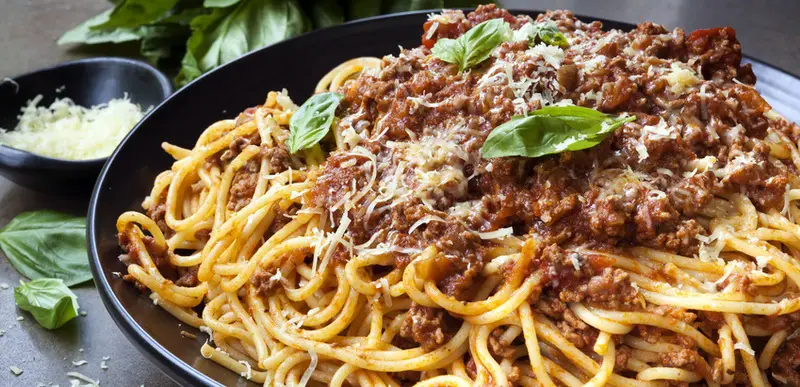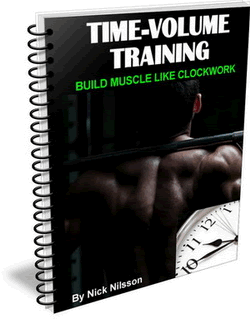By Drew Stegman
If you're anything like me, you want to gain muscle without putting on a single ounce of body fat.
After graduating college, I was able to pack on over 30lbs of muscle without any fat at all. I had seen plenty of guys using the traditional "bulking up" technique in the past and sure they we're getting much bigger, but I noticed that a majority of the size they were putting on was fat.
Many bodybuilders fall for the mindset of "You have to eat big to get big." Although there is some truth to this, if you stuff your face with calories your body doesn't need, you'll simply end up getting fat, not muscular.

So how do you avoid gaining fat while gaining muscle?
Nutrition is of incredible importance. Rather you're trying to gain muscle, lose fat or just become a healthier person, nutrition always comes first. Just because you're trying to put on some size doesn't mean you can eat whatever you want. You'll still need to focus on eating a sufficient amount of calories, but your main priority should be putting real, natural foods into your body.
Forget about junk food.
Here are some examples of some healthy, natural foods that you can put into your body:
Proteins: chicken, turkey, fish, pork, red meat, eggs, etc.…
Fats: cheese, butter, almonds, olive oil, coconut oil, etc….
Carbs: beans, rice, potatoes, vegetables, fruits, etc….
Eat these foods on a regular basis and you'll be golden. Many bodybuilders believe that it's important to consume more calories than their bodies need each day to gain muscle, but this is simply not the case.
Always make sure you're getting a majority of your carbs after your workouts. I always make sure I get about 75% of my total carb consumption after my workouts and the rest in the morning. Contrary to popular belief, you really don't need that many carbohydrates to gain muscle. In fact, you can gain muscle on a low carb diet.
Whenever making adjustments to your calorie consumption, it's important to increase things slowly. If you increase your calorie consumption drastically, your body can have a difficult time adjusting and the result will be unwanted fat gain. So simply be patient with your body and allow it to adjust before making further changes.
Cardio
I recommend you keep your cardio to a minimum when trying to gain muscle. The reason is simple: When you do cardio and lift weights, you're sending your body two different signals. The different signals can literally confuse your muscles, making it impossible to see any results. Nevertheless, cardio is fine if you're trying to lose fat and I actually recommend it in conjunction with weights if that's your situation.
Now I'm not saying you should never do cardio if your goal is mass gain, I'm simply saying you should keep it to a minimum. This means just three, 20 minute sessions of cardio per week. No more, no less.
I always recommend sprints instead of long, steady state cardio. Just take a look at marathon runners vs. sprinters. Sprinters often have huge, muscular quads and marathon runners are often skinny and weak.
High intensity interval training is a great way to get your heart rate elevated, burn a lot of calories and get a great leg workout as well. The idea goes that you sprint on the treadmill for one minute and rest/jog for the next, and repeat. Do this for approximately 20 minutes after your weight training sessions for a great cardio workout.
How To Gain Muscle Without Fat: Summary
It's really not that difficult to gain muscle without fat. It might take some work ethic, but by following a few basic guidelines you will be well on your way to adding pounds of muscle and staying lean all year round as well! Here's some advice you can take to the bank.
1. Eat real foods!
- Eat whole, natural foods 98% of the time.
- Increase your calorie consumption slowly.
- Eat at your maintenance level (amount of calories it takes to maintain your body weight).
- Eat a low carb diet.
- Get a majority of your carbs (75%) during the post-workout period. The rest in the morning.
- Stop eating junk food. If you eat crappy, you're going to look crappy!
2. You must get STRONG!
- You need to focus on the method of progressive overload (increasing the weight on the bar workout after workout).
- If you're not getting stronger, you're not getting bigger.
- Use the big three - squats, deadlifts and the bench press.
- Keep a training journal to ensure you're still seeing progress in the gym. Right down the umber of sets, reps and types of exercises you did in each workout.
- Never workout more than 45 minutes at a time.
3. Do the right kind of cardio
- Keep your cardio to a minimum - no more than three, 20 minute sessions per week.
- Forget about long, steady state cardio and do HIIT (high intensity interval training) instead. Go hard for one minute and rest the next - repeat for 20 minutes.
- Do your cardio after lifting weights. Doing it before can wear you out and make your lifting intensity suffer.
4. Enjoy the process
- Be patient with it - building muscle takes time.
- Make your workouts fun and exciting.
- Find a workout partner to help you stay motivated.
- Never give up!
Final Words
Well that's pretty much it. Follow the advice above and you'll be sure to gain muscle without fat. As I said, it's really not that difficult to implement everything above - it just requires persistence and dedication. Remember to always set realistic goals and never stop until you get there!
Learn unique muscle and strength workouts here.
![]()
More From Fitstep.com
| Compound Exercise Overload Training for Mass | |
| Why I Hate Supplements | |
| The Great Big List of Calorie-Free Foods | |
| The CURE For Stubborn Quads |
Share This Page...
---
Home -> Muscle and Strength -> Tips and Articles -> Gain Muscle Not Fat



